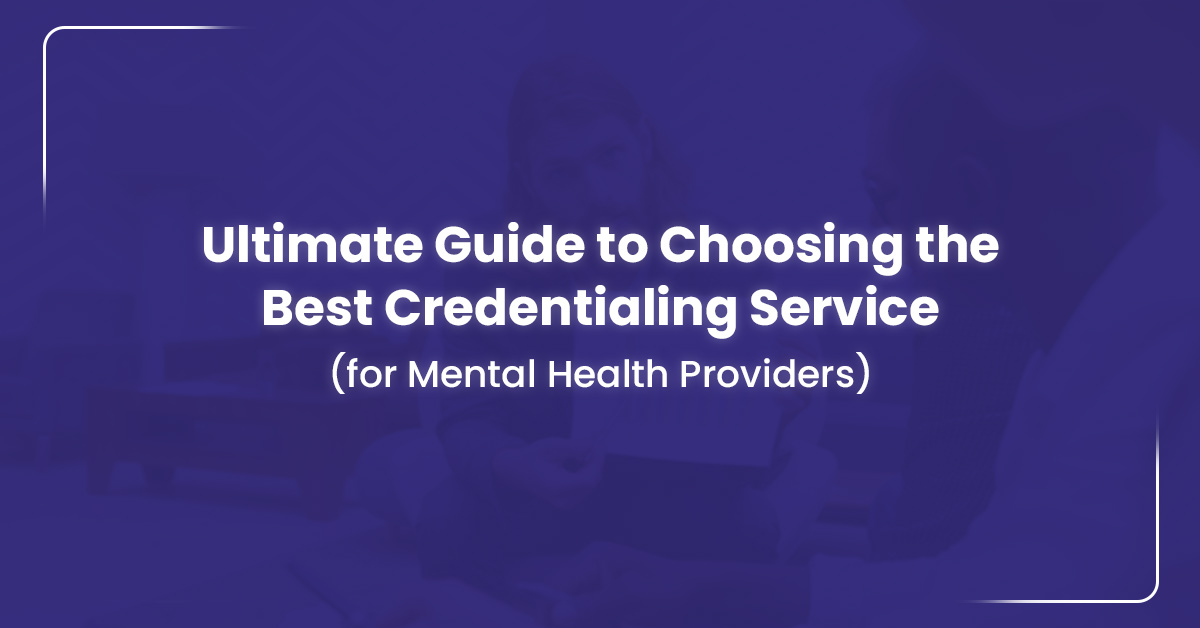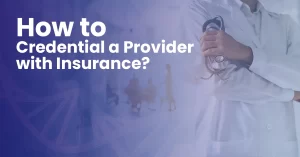Credentialing services help mental health (and other) providers with verification and compliance, making it easy for them to access insurance networks and offer care.
Poor credentialing leads to denied insurance claims, legal issues, and unsafe patient care. Therefore, choosing a good credentialing service with mental health expertise and experience is important.
This BellMedEx guide covers key factors to consider when choosing the best credentialing service for mental health providers. We’ll also talk about common mistakes you should not make and clues you can use to stay away from any problems.
Why Struggle with Credentialing When We Can Help? 🤗
Stop struggling alone. BellMedEx’s proven credentialing system helps providers across the country maximize revenue and productivity. Let us help you thrive.
13+ Key Factors to Consider When Choosing a Credentialing Service for Mental Health Providers
Look for these things when choosing the best credentialing service for mental health providers:
- Experience and expertise
- Comprehensive services
- Clear performance metrics
- Partnerships and affiliations
- Tech and innovations
- Customizations and flexibility
- Regulatory compliance
- Transparent pricing
- Faster turnaround time
- Improved online reputation
- Staff training and resources
- Ability to scale up or down
- Broad geographic coverage
- Client support and ongoing maintenance
Let us detail down each aspect now.
1. Experience & Expertise in Mental Health Credentialing
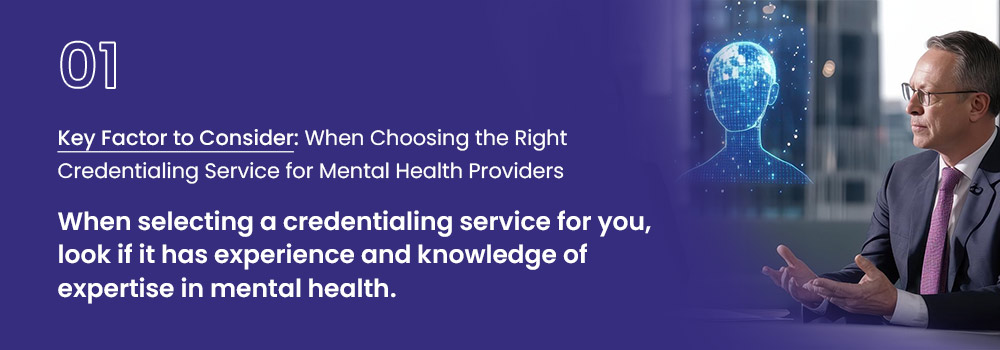
When selecting a credentialing service for your mental health specialty, look if it has experience and knowledge of expertise in mental health. An insurance credentialing provider with a proven, relevant track record can effortlessly help a mental health clinician get credentialed and enrolled in premium insurance networks.
Ensure your credentialing partner understands the unique challenges and requirements of different mental health specialties. Don’t choose a credentialing service based solely on cost or recommendations without verifying their experience and expertise.
To confirm the experience and expertise in credentialing for mental health providers, you can ask a series of questions, such as:
- How many years have you been in credentialing for mental health providers?
- Which insurance companies or networks have you worked for credentialing mental health providers?
- What is your process for verifying the credentials of mental health providers?
- What tools or software do you use to manage the credentialing process?
- How do you ensure the accuracy and completeness of credentialing applications?
2. Comprehensive Mental Health Credentialing Services
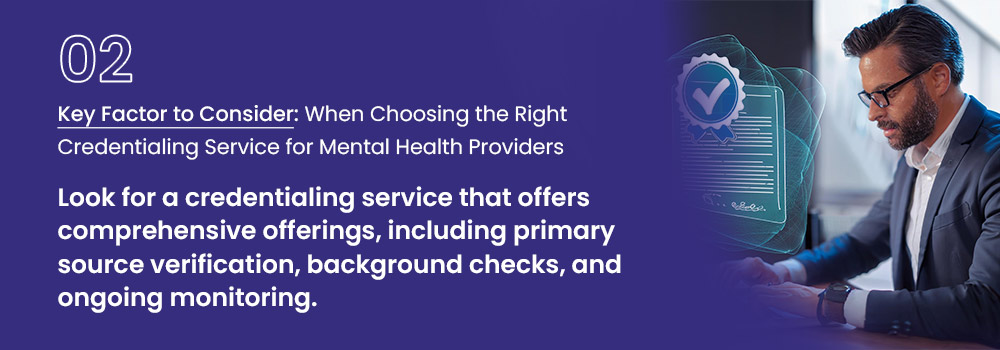
Look for a mental health credentialing service that offers comprehensive offerings, including primary source verification, background checks, and ongoing monitoring. It ensures that your credentials are always current and compliant, minimizing risks of credentialing errors.
Avoid credentialing providers that offer limited services, as they may overlook essential components. Look for warning signs, such as unclear service descriptions or resistance to detailing their processes.
You might ask these questions to ensure you’re partnering with the right credentialing company.
- What specific credentialing services do you offer for mental health providers?
- Do you handle initial credentialing, re-credentialing, and ongoing monitoring?
- Do you offer a consultation session to understand the credentialing process?
- Do you offer other services such as compliance consulting or audit support?
3. Clear Metrics to Evaluate Credentialing Quality
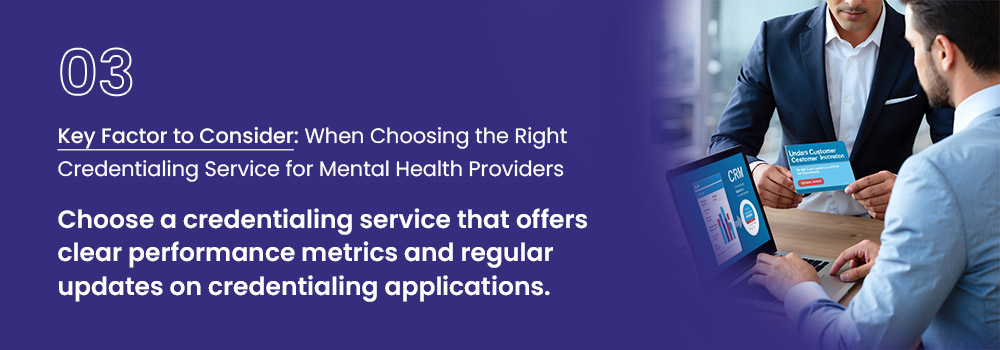
Choose a credentialing service that offers clear performance metrics and regular updates on credentialing applications. This transparency helps mental health practitioners confirm the service’s reliability and efficiency. Many mental health providers may not consider this when choosing a credentialing service for them, which is a mistake.
When you ask them about it, they may show late responses or a lack of structured reporting. Reliable performance metrics will help you track progress, identify issues early, and ensure a smoother credentialing process.
Always ask for details about their KPIs by asking these questions:
- What’s the length of time for a provider to submit an application?
- What’s the number of initial credentialing files returned for additional verification?
- What is your success rate for initial credentialing and recredentialing?
- What is the average turnaround time for completing the credentialing process?
- How do you track and minimize errors in credentialing applications?
4. Partnerships with Major Insurance Networks for Mental Health
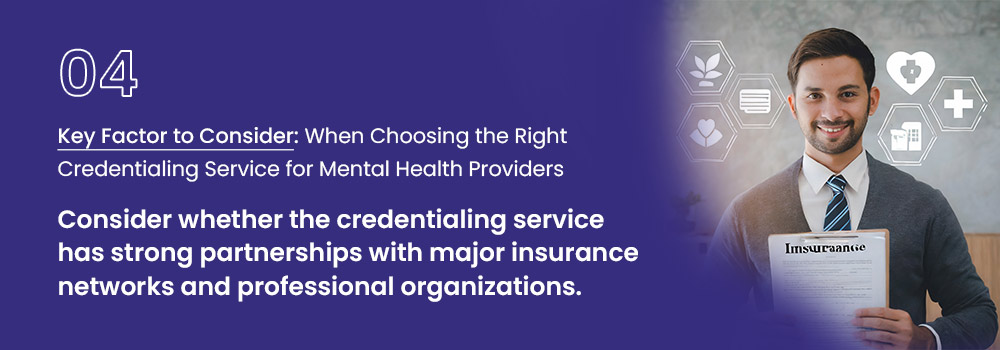
Consider whether the credentialing service has strong partnerships with major insurance networks and professional organizations. It helps facilitate a smoother credentialing process, giving mental health professionals access to important in-network contracts. Failing to verify this could limit your mental health practice’s opportunities.
A provider with strong affiliations can improve your mental health clinic’s visibility and expedite your credentialing journey. Don’t hesitate to ask these questions when your choose a credentialing service as a mental wellness expert:
- Which insurance networks and payers do you have relationships with?
- How do you stay updated with the credentialing requirements of payers?
- Can you provide case studies from mental health providers who have successfully been credentialed with major insurance networks through your services?
- Do you help with negotiating contracts and advocating for mental health providers with relevant insurance networks?
5. Technology and Innovation for Therapy Credentialing
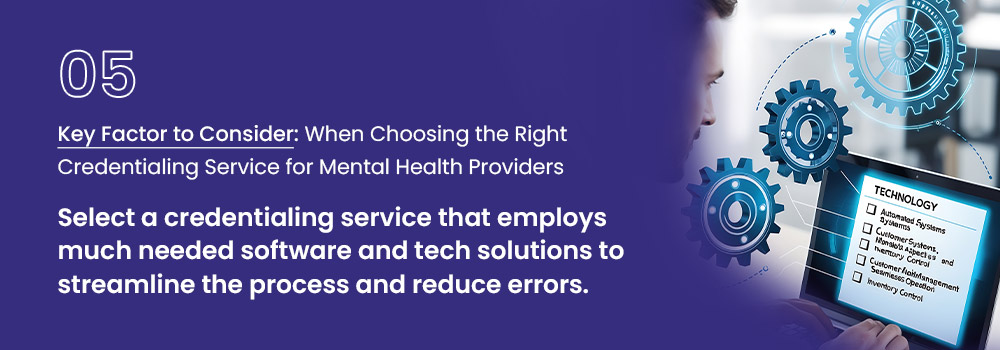
Select a mental health credentialing service that employs much needed software and tech solutions to streamline the process and reduce errors. A common mistake is choosing a provider with outdated systems, which can lead to unnecessary delays.
An innovative credentialing provider will use automation, user-friendly platforms, and integration with your existing systems to simplify the credentialing process. This also ensures solid data security and compliance with regulations like HIPAA.
Confirm if your mental health credentialing partner has outdated software, lack of cloud-based systems or inadequate data security measures.
You can ask these questions to analyze their tech solutions:
- Does the credentialing system integrate with our existing EHR and PMS?
- Can you provide examples of recent automation or innovation you implemented?
- How does the credentialing partner ensure the data security and confidentiality of mental health providers and patients?
Don’t Waste One More Minute on Credentialing – Call BellMedEx Now 🤙🏻
Our dedicated team immediately improves your productivity by fully managing every credentialing detail quickly and efficiently.
6. Custom and Flexible Credentialing Solutions for Mental Health
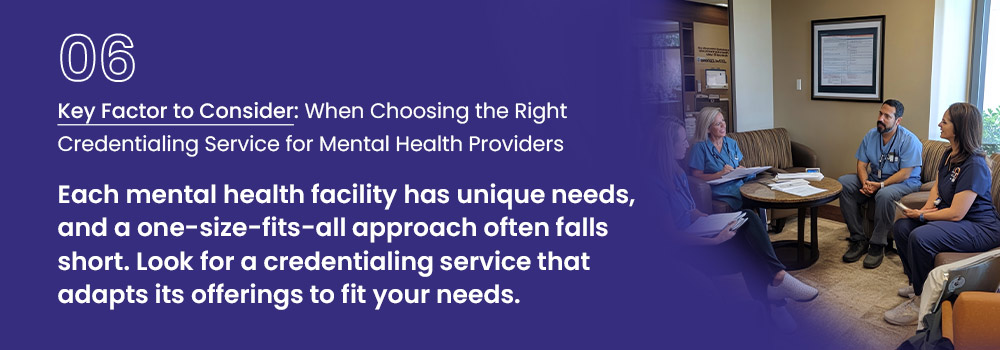
Each mental health facility has unique needs, and a one-size-fits-all approach often falls short. Look for a credentialing service that adapts its offerings to fit your needs. You as a mental health provider should not assume all services will meet your needs.
Run away from the credentialing partner if it shows lack of willingness to discuss tailored options. A customized approach ensures that your credentialing process aligns perfectly with your practice’s goals and changes.
Ask these questions to confirm your credentialing partner’s customization and flexibility:
- Can the credentialing process be customized to meet the specific needs of my mental health practice (e.g., psychiatrists, psychologists, counselors)?
- How flexible is your credentialing service in terms of scaling up or down?
- How quickly can you adapt to changes in regulatory requirements or your practice’s needs?
7. Regulatory Compliance for Mental Health Providers
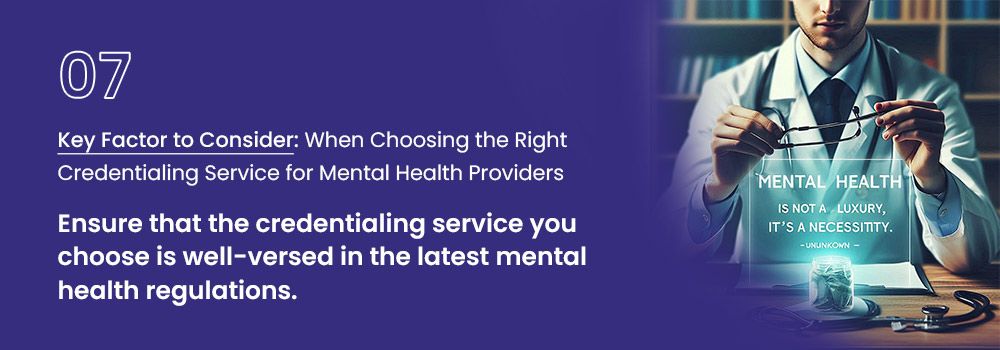
Staying compliant with regulations extremely important in healthcare. Mental health providers must adhere to high standards, and failing to do so can cost you delays and potential legal issues.
Ensure that the credentialing service you choose is well-versed in the latest mental health regulations. Don’t overlook the importance of accreditations like NCQA or URAC. Be cautious of credentialing providers that don’t clearly explain their compliance processes or show a lack of understanding of state and federal regulations.
You can ask these questions to confirm their stance on compliance:
- Do you offer credentialing support during audits and inspections?
- How do you ensure credentialing compliance for mental health providers?
- What kind of documentation and reporting do they provide to ensure compliance?
8. Transparent Pricing for Credentialing Mental Health Practices
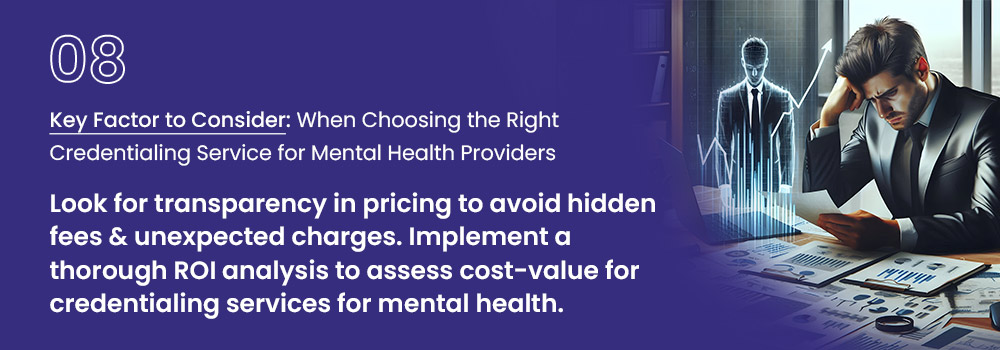
While it’s tempting to go for the lowest price, remember that quality often comes at a higher price. Credentialing is an important service that impacts your mental health career and practice.
Look for transparency in pricing to avoid hidden fees and unexpected charges. Stay away from mental health insurance credentialing services that provide unclear pricing structures or push low-cost options without explaining their limitations.
A thorough ROI analysis will help you determine if a higher-priced service is worth it for the efficiency and expertise it brings. You can also ask these question:
- Is your pricing structure transparent, with no hidden fees?
- Can you provide case studies of cost savings achieved for other clients?
- Do you offer flexible payment plans or discounts for long-term contracts?
- Are there other services included in the cost that add value to my practice?
9. Faster Turnaround Time for Credentialing
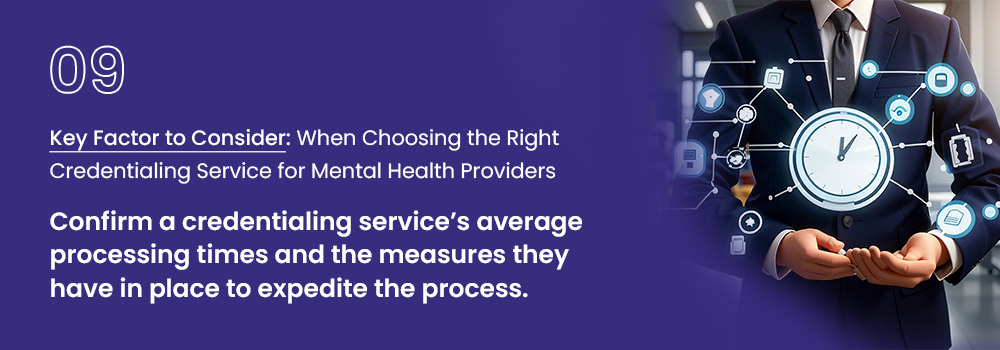
Quick processing times help maintain your mental health practice’s operations. On the other hand, delays in credentialing can lead to lost revenue and hinder your ability to provide care. Don’t be afraid to ask about turnaround times upfront.
Confirm a credentialing service’s average processing times and the measures they have in place to expedite the process. A provider with efficient workflows can reduce credentialing time, allowing you to focus on patient care sooner.
You can ask these questions to have an idea of the turnaround time:
- What is the average time taken to complete the credentialing process?
- Do you offer expedited credentialing, and if so, what is the additional cost?
- How do you update clients about the status of their credentialing applications?
- How do you handle delays in the credentialing process?
10. Improved Reputation and Positive Reviews
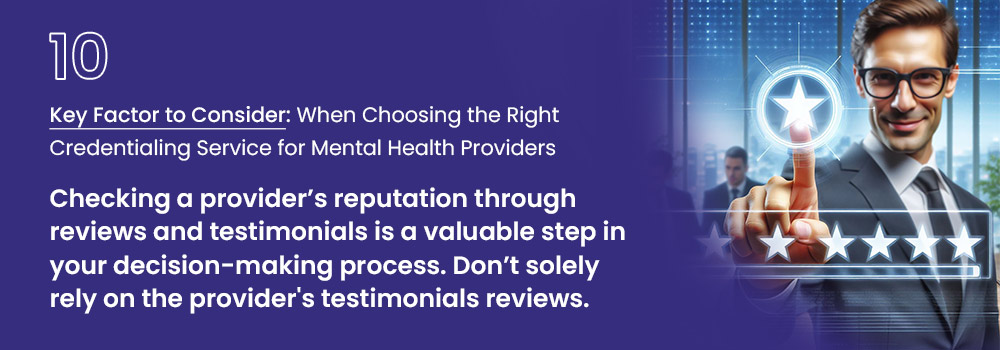
Checking a provider’s reputation through reviews and testimonials is a valuable step in your decision-making process. Online reviews can provide insights into a credentialing service’s reliability and effectiveness.
Don’t solely rely on the provider’s testimonials reviews. Look for overly positive reviews that may be scripted. Run away from the credentialing provider if there’s lack of reviews or consistent complaints across different platforms.
Researching industry recognition and speaking with current clients can provide a well-rounded view of the provider’s reputation.
Ask yourself these questions:
- Are there positive testimonials or references from other mental health providers?
- What do online reviews and ratings on platforms like Google, Yelp, and other industry-specific sites say about their credentialing services?
Ask the credentialing service these questions:
- How do you handle complaints or negative feedback from clients?
- What is your client retention rate, and what feedback do you receive from long-term clients?
11. Mental Health Practice Staff Training and Resources
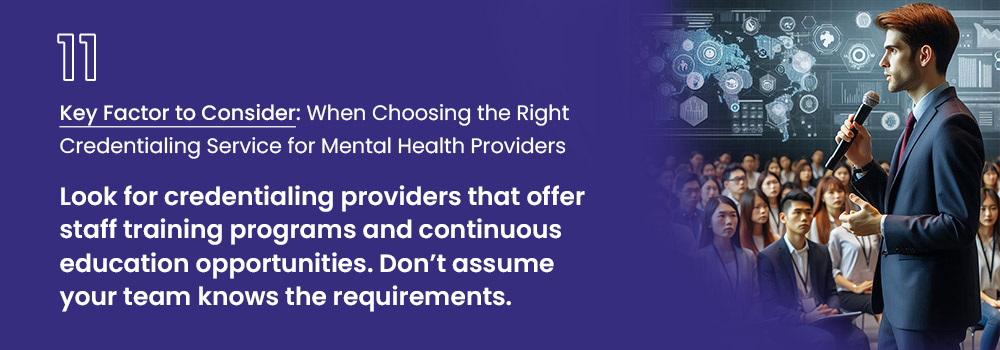
A credentialing service should provide training and resources for your staff. The credentialing process involves many forms and documentation. Missing paperwork delays your credentialing application, causing frustration and setbacks.
Look for credentialing providers that offer staff training programs and continuous education opportunities. Don’t assume your team knows the requirements. You can ask the credentialing provider these questions:
- Do you provide any resources or training materials to help clients understand the credentialing process?
- What kind of training do your staff undergo to stay updated on credentialing requirements and best practices?
- Are there opportunities for ongoing education or updates for clients regarding changes in credentialing requirements?
- Can clients access credentialing experts for consultations or questions during the process?
- Do you offer guides, webinars, or workshops to assist clients with the credentialing process?
Is Credentialing Draining Your Energy? – There’s a Better Way 🌟
Reclaim your passion for healing by letting BellMedEx completely manage your credentialing and privileging. Our dedicated team loves solving credentialing challenges.
12. Scalability According to Mental Health Practice’s Needs
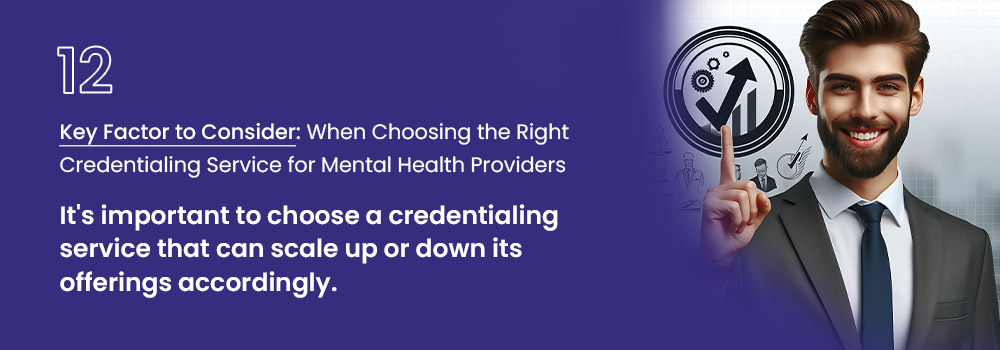
As your mental health practice grows, your credentialing needs may change. It’s important to choose a credentialing service that can scale up or down its offerings accordingly.
Look for a credentialing outsourcing company that takes the time to understand your specific situation and can adjust their services as you expand. Stay away from credentialing providers that are not willing to discuss customization and scalability.
You can ask them these questions to be clear about their scalability:
- How do you manage an increase in the number of your clients?
- Can your credentialing services be scaled up or down based on our needs?
- How do you plan to see future growth and changes in the healthcare industry?
13. Broad Geographic Coverage of Credentialing Services
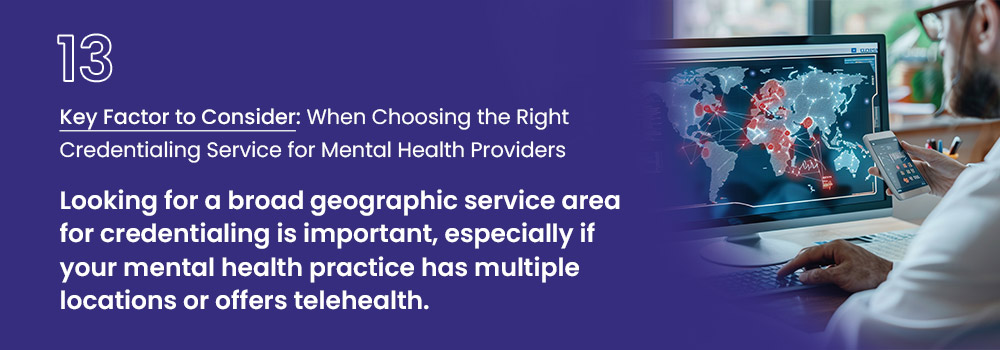
Looking for a broad geographic service area for credentialing is important, especially if your mental health practice has multiple locations or offers telehealth. Each state has its own requirements, so verify that the provider understands local regulations.
Credentialing providers with broad geographic coverage will adhere to different state laws, licensure, and insurance networks. And they help facilitate smoother credentialing processes and better relationships with local payers.
Avoid credentialing providers with vague knowledge about state-specific credentialing rules or an inability to manage multi-state credentialing.
You can start asking these questions to confirm the service area of your potential credentialing partner:
- Which geographic areas do you cover?
- Do you have expertise in the credentialing requirements to different states?
- How well-connected are you with local insurance providers?
- Are there plans to expand your services to new regions or states?
14. Credentialing Client Support and Ongoing Maintenance
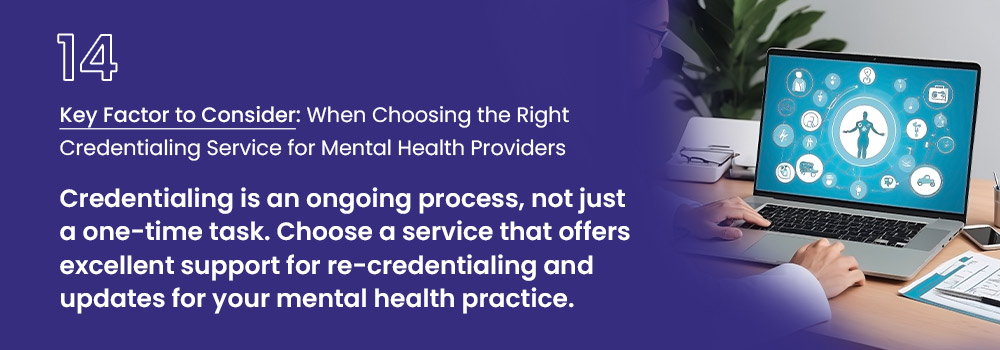
Insurance credentialing for mental health providers is an ongoing process, not just a one-time task. Choose a service that offers excellent support for re-credentialing and updates for your mental health practice. Responsive customer service helps prevent delays and address issues.
Look for providers that assign dedicated account managers for consistent communication. And run away from those that show slow response times or a lack of a collaborative approach. A supportive partner will help maintain your credentials and ensure compliance.
- What kind of customer support do you offer?
- Do you provide ongoing maintenance and re-credentialing services?
- What channels (phone, email, chat) are available for clients to reach out?
- How do you inform your clients about changes in credentialing requirements or regulations?
- Is there a system in place for clients to provide feedback on your credentialing services?
Conclusion
To conclude, proper credentialing lays a strong foundation for mental health practices to thrive. It not only opens doors to insurance contracts but also minimizes compliance risks. Use this BellMedEx guide to make an informed decision when selecting a credentialing service.
Look for comprehensive offerings, innovative tech, customization, and responsive support. Steer clear of vague providers lacking transparency or expertise. Invest time in finding the right partner so you can devote energy to your passion of caring for patients. With rigorous credentialing, mental health providers gain peace of mind and practice success.
Don’t Go It Alone – Partner with the Top Credentialing Pros 🦸🏻♂️
BellMedEx has credentialed thousands of mental health doctors across the nation. Leverage our expertise to accelerate your practice success and productivity.
